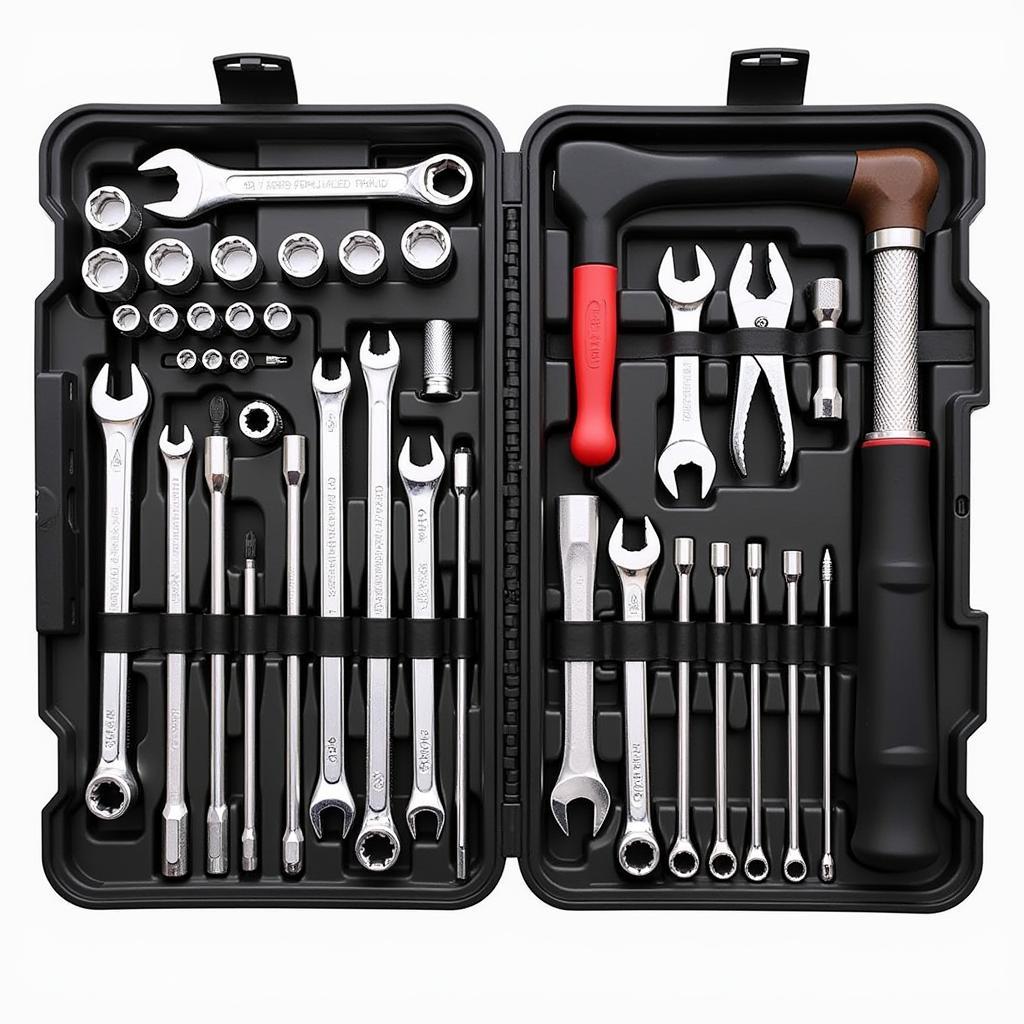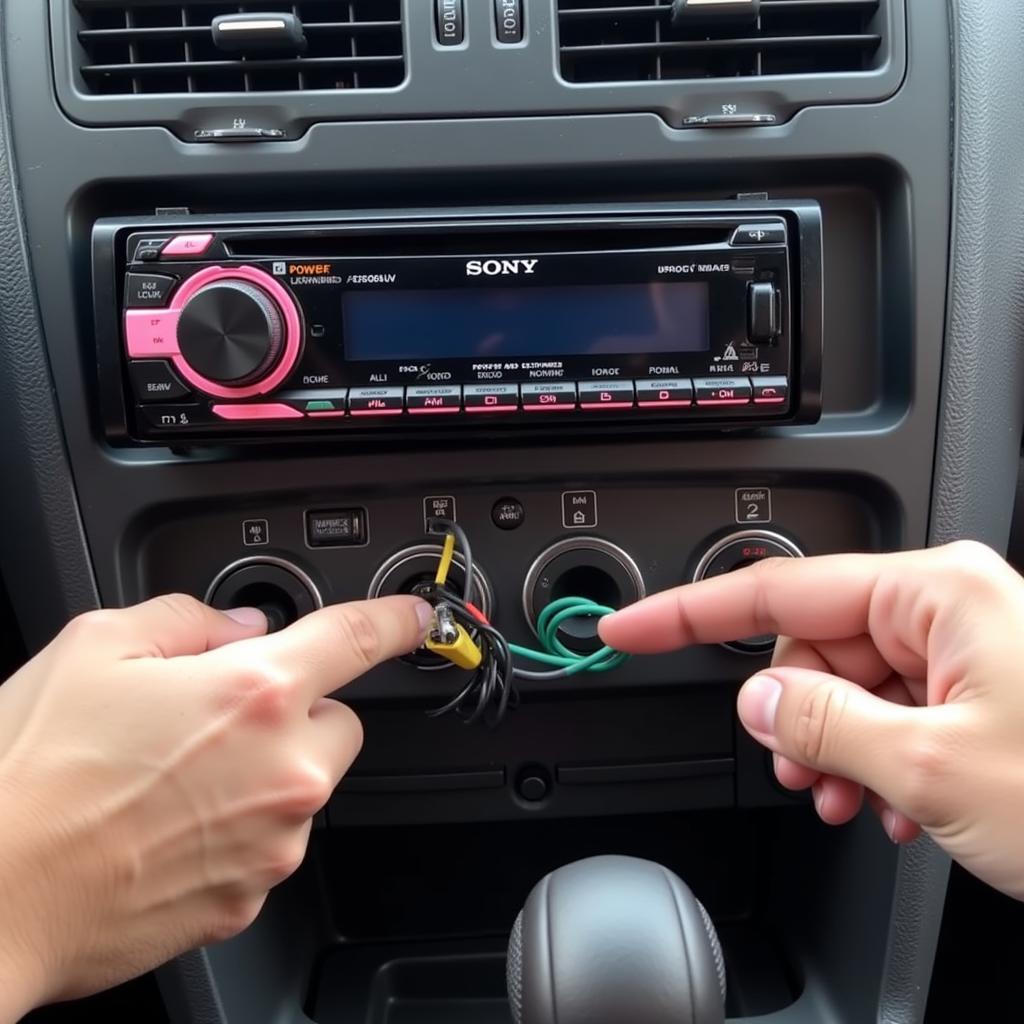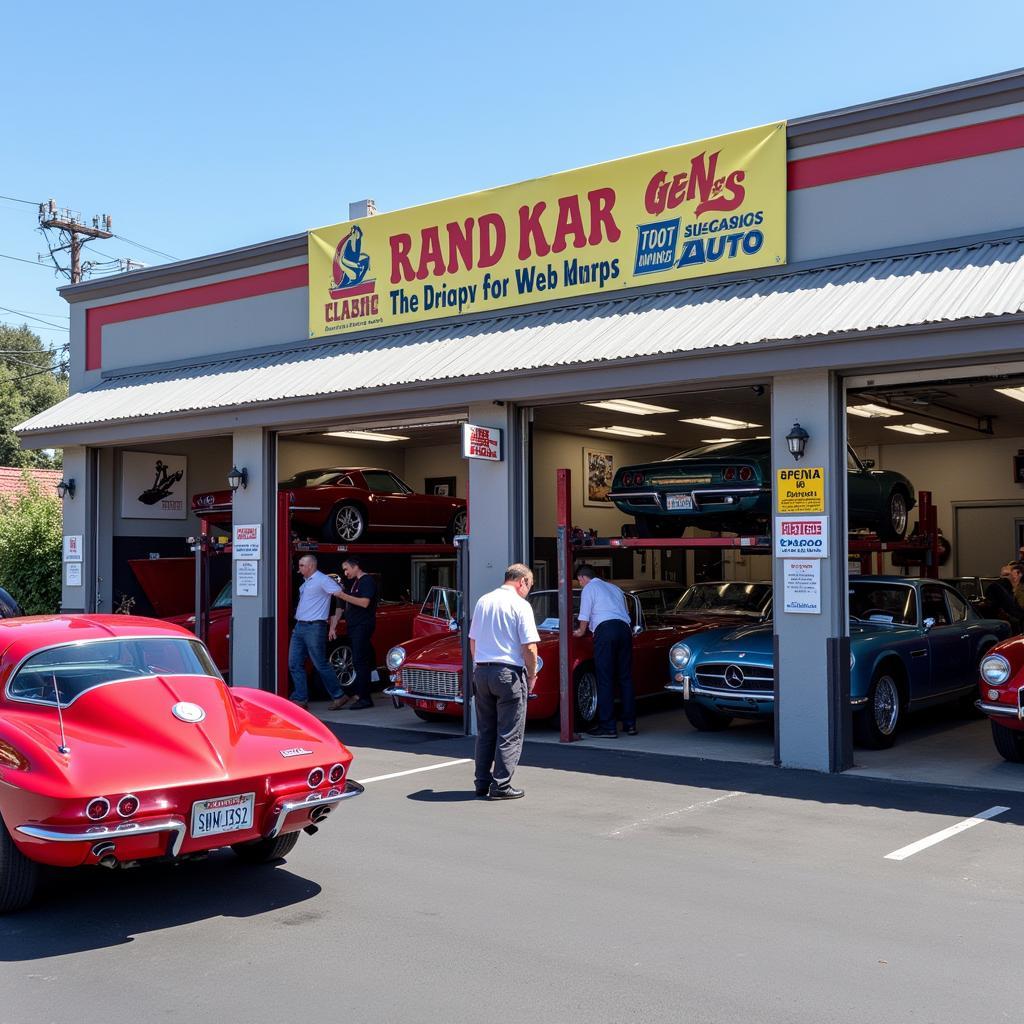Owning the right tools can make the difference between a minor inconvenience and a major headache when it comes to car trouble. Whether you’re a seasoned mechanic or a car enthusiast looking to tackle DIY repairs, having a reliable tool kit specifically designed for automotive work is essential.
This comprehensive guide will delve into the world of tool kits designed for fixing cars, helping you make an informed decision based on your needs and budget.  Essential Car Tool Kit
Essential Car Tool Kit
Understanding Your Automotive Needs
Before diving into the specifics of tool kits, it’s crucial to assess your automotive expertise and the types of repairs you anticipate handling. Are you comfortable with more complex tasks like brake jobs and suspension work, or are you primarily focused on basic maintenance and minor repairs?
For instance, if you plan to [fix a rust spot on a car fender], a basic tool kit might not suffice. You’ll need specialized tools for sanding, body filler application, and painting. Similarly, [fixing a rust hole in a car roof] demands a different set of tools and expertise.
Types of Car Tool Kits
Car tool kits are available in various configurations to suit different skill levels and project scopes.
1. Basic Tool Kits
As the name suggests, basic tool kits are ideal for essential maintenance tasks and minor repairs. These kits typically include:
- Screwdrivers: A variety of Phillips, flat-head, and Torx screwdrivers to handle common fasteners.
- Wrenches: A combination of open-end and box-end wrenches in standard and metric sizes.
- Socket Set: A basic socket set with a ratchet handle, extensions, and a range of sockets for removing and installing nuts and bolts.
- Pliers: Needle-nose pliers, slip-joint pliers, and adjustable pliers for gripping, holding, and cutting.
- Hammer: A standard claw hammer for general use.
- Tape Measure: For measuring distances and components.
- Utility Knife: For cutting materials and stripping wires.
2. Mechanic’s Tool Sets
Mechanic’s tool sets are comprehensive kits designed for professional mechanics and serious DIY enthusiasts tackling a wide range of repairs. These sets often include hundreds of pieces, such as:
- Extensive Socket Sets: A wide selection of sockets, including deep sockets, impact sockets, and specialty sockets, covering various sizes and drive types.
- Wrenches: An extensive set of combination wrenches, adjustable wrenches, and torque wrenches.
- Screwdrivers: A comprehensive assortment of screwdrivers, including precision screwdrivers, offset screwdrivers, and impact driver bits.
- Pliers: A variety of pliers, including locking pliers, diagonal cutting pliers, and long-nose pliers.
- Specialty Tools: Tools specific to automotive tasks, such as brake bleeding kits, fuel line disconnect tools, and electrical testers.
3. Specialty Tool Kits
In addition to general-purpose kits, numerous specialty tool kits cater to specific automotive tasks, including:
- Electrical Diagnostic Kits: These kits include tools for testing circuits, diagnosing electrical faults, and working with wiring.
- Brake Repair Kits: Designed for bleeding brakes, replacing brake pads, and other brake-related repairs.
- Suspension Tool Kits: These kits include specialized tools for working on shocks, struts, ball joints, and other suspension components.
- Engine Repair Kits: For tasks like timing belt replacement, head gasket repairs, and other engine-related jobs.
Factors to Consider When Choosing a Tool Kit
Choosing the right tool kit for fixing cars depends on several key factors:
1. Quality and Durability
Investing in a high-quality tool kit from a reputable brand ensures that the tools are built to last and can withstand the rigors of automotive work. Look for tools made from durable materials like chrome vanadium steel or alloy steel.
2. Tool Organization
A well-organized tool kit saves time and frustration. Look for kits with clearly marked tool locations and secure storage to prevent tools from shifting or getting damaged.
3. Budget
Tool kit prices vary significantly depending on the number of pieces, quality, and brand. It’s essential to set a budget that aligns with your needs and the level of investment you’re comfortable with.
4. Warranty
Reputable tool manufacturers often offer warranties on their products. A good warranty provides peace of mind, knowing that you’re covered in case of defects or premature tool failure.
Tips for Maintaining Your Car Tool Kit
- Keep Your Tools Clean and Lubricated: Wipe down tools after each use and apply a light coat of oil to prevent rust and corrosion.
- Store Your Tool Kit Properly: Store your tool kit in a clean, dry place to protect it from moisture and damage.
- Inspect Tools Regularly: Check your tools for any signs of wear and tear, and replace any damaged or worn-out tools promptly.
Conclusion
Having the right tools is crucial for anyone looking to tackle car repairs or maintenance. By understanding your automotive needs and considering factors like quality, organization, budget, and warranty, you can choose the best tool kit for fixing cars that will serve you well for years to come. Remember to invest in quality tools, maintain them properly, and expand your kit gradually as your skills and project scope grow.
For personalized advice or assistance with any car repairs, feel free to contact us at AutoTipPro. Our team of expert mechanics is here to help!
Phone: +1 (641) 206-8880
Office: 500 N St Mary’s St, San Antonio, TX 78205, United States
FAQs
1. What is the most important tool in a car tool kit?
A socket set is arguably the most versatile and essential tool in any car tool kit, allowing you to remove and install a wide range of nuts and bolts.
2. Can I use a regular tool kit for car repairs?
While you can use some tools from a regular tool kit, investing in a dedicated car tool kit is recommended. Car tool kits include specialized tools designed specifically for automotive applications.
3. How often should I replace my car tools?
The lifespan of car tools depends on their quality, usage, and maintenance. However, it’s a good practice to inspect your tools regularly and replace any damaged or excessively worn-out tools.
4. What is the difference between a torque wrench and a regular wrench?
A torque wrench allows you to tighten fasteners to a specific torque specification, which is crucial for preventing over-tightening or under-tightening, which can lead to damage or safety hazards.
5. What should I do if I encounter a car repair task that’s beyond my skill level?
It’s always best to err on the side of caution and seek professional help from a qualified mechanic if you’re unsure about a specific repair task. Attempting repairs beyond your skill level can potentially lead to further damage or safety risks. If you are looking for a reliable source of information on how to perform a task like [how to fix a rusted scratch on car] or [how do you fix paint damage on a car] you can always turn to online resources. For example, you can learn [how to fix rust inside my car] by reading comprehensive articles written by experts.







Leave a Reply